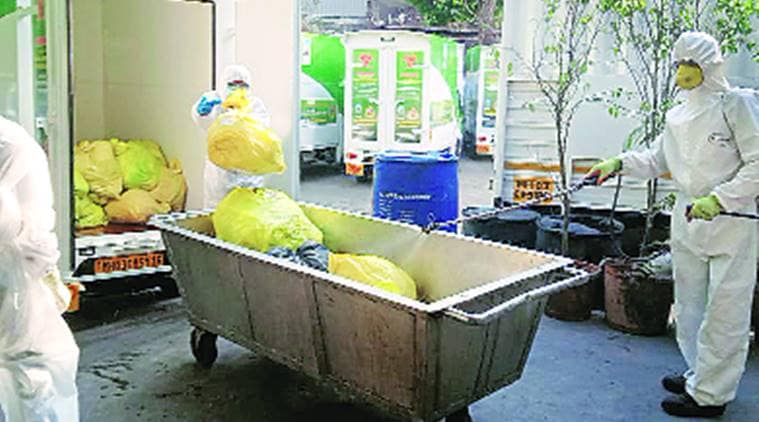 Workers handling Covid waste at SMS plant in Nilothi
Workers handling Covid waste at SMS plant in Nilothi
The two common biomedical waste treatment facilities (CBWTF) that cater to most of the hospitals in the city are seeing a rise in load since the Covid outbreak, and have demanded that they be allowed to divert their waste to waste-to-energy plants.
The two CBWTFs in Delhi are SMS Water Grace BMW Pvt Ltd in West Delhi’s Nilothi and Biotic Waste Solutions Pvt Ltd in Jahangirpuri, with an operational capacity of 12 and 34 tonnes per day respectively.
Amit Nilawar from SMS Water Grace said it has been over a month since they wrote to the Directorate General of Health Services of Delhi government for permission to allow their surplus waste to be sent to waste-to-energy plants. He said permission to expand the facility is also awaited, even as the waste load keeps rising. “There are several new quarantine centres opening in the city, but we are in a position where we would not be able to take waste from these new facilities if swift action is not taken,” Nilawar said.
SMS Water Grace collects Covid waste from government hospitals including Lok Nayak and Safdarjung, quarantine centres, isolation facilities, testing centres, dispensaries, private hospitals and laboratories in six districts of Delhi — west, southwest, central, Shahdara, east and northeast. Biotic Waste Solutions covers north, northwest, New Delhi, south, and southeast districts. It collects Covid waste from AIIMS, RML Hospital and Lady Hardinge Medical College too.
A Delhi governemnt spokesperson said they were looking into the issue.
Nilawar said their incinerator is burning 12 tonnes of biomedical waste (Covid and non-Covid) per day now, against around six tonnes in the pre-Covid times. “This has increased the risk of snags in machines,” he said.
Vikas Gehlot, director of Biotic Waste Solutions, said their facility is disposing of around 22 tonnes of waste per day.
He also said a lot of waste coming into the plant is non-medical waste such as bottles, food and plastics, which he said could damage their machinery.
He said the firm has also asked the government to pay Rs 50 per kg for Covid-19 waste, citing increase in operating cost.